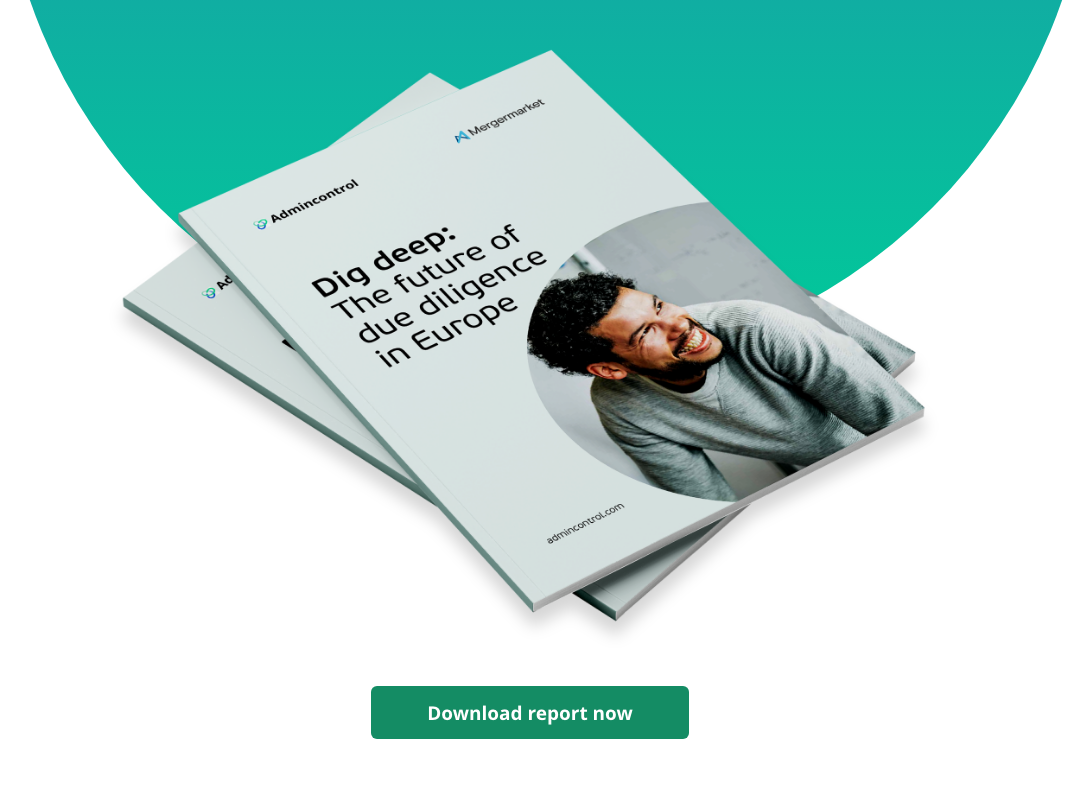Research conducted by Mergermarket and Admincontrol in 2022 reveals how due diligence strategies in Europe are evolving as newer geopolitical factors impact deal-making across the region.
ESG due diligence - one to watch
Despite 72% of European dealmakers predicting ESG due diligence will become increasingly critical to the success of an M&A, just 5% say it is currently their top priority, something we believe will change over the next couple of years.
Indeed, as consumers and shareholders now expect organisations to pay more than mere lip service to sustainability, diversity and environmental protection, these factors will be scrutinised more closely in potential deals.
ESG due diligence is becoming more vital…in the coming years, evaluating the inclusion of the UN Sustainable Development Goals and overall sustainability standards will be critical.”
The importance of ESG due diligence is not simply an inevitable consequence of increasing environmental or diversity and inclusion standards, however. The survey also highlights that many dealmakers feel that “a positive ESG appraisal leads to a higher valuation” and that a poor appraisal has the opposite effect.
Harvard Business Review agrees, arguing a better ESG performance equates to a greater release of capital.
First, an ESG focus can help management reduce capital costs and improve the firm’s valuation. That’s because as more investors look to put money into companies with stronger ESG performance, larger pools of capital will be available to those companies.
It’s also a case of ESG practices usually reflecting investment in the longer-term view - recruiting a diverse board of directors, for example, seeking to reduce the carbon footprint or introduce more environmentally supportive production methods tend to take time to implement. Demonstrating a commitment to a more ethical and sustainable bigger picture that goes beyond short-term profit helps increase company valuation. As a result, these are all critical factors in ESG due diligence.
Higher valuations are naturally a positive for sellers, but buyers benefit too, with improved transparency making it easier to evaluate a target company more accurately. Accurately measuring ESG performance during the due diligence process is still somewhat challenging, however.
As PwC highlights, ESG covers such a wide range of topics, so it can be tricky to reach consistent and useful criteria for measurement. Furthermore, most ESG performance data is still self-reported, making an auditable benchmark difficult even within the same sector. And, of course, self-reporting is also open to considerable bias. However, publicly documented frameworks for reporting ESG performance data are starting to emerge, with data experts such as Refinitiv offering a comprehensive method for tracking and reporting ESG performance scores over time.
How this data impacts a company's valuation is also a subject of debate, however. While some still believe ESG factors are largely non-financial, we’ve seen here how newer thinking directly correlates ESG practices to financial performance. According to EY, there are two main methods for incorporating ESG into a valuation; the market approach and the income approach.
The market approach - compares the company’s performance against ESG criteria for the given sector and then calibrates the valuation to determine the target company’s performance against its sector peers.
The income approach - uses existing macroeconomic metrics, such as inflation rates or GDP, to analyse ESG opportunities and risks.
While both approaches have their difficulties in practice, not least how to incorporate non-financial information into quantitative metrics, EY sees ESG valuation as a work in progress. Despite this, it is clear momentum is building to meet the growing demand for accurate ESG measurement during the due diligence process.
The increasing influence of activist shareholders
Of course, shareholders and consumers are also concerned that a company they are invested in is making ethical and sustainable decisions when considering a merger or acquisition.
However, shareholders may also seek to use their influence to change the terms of a deal, to stop it in its tracks entirely, or even to persuade the board to acquire a company or division they had not considered.
When shareholders are actively engaged in using their influence to bring about particular activities or a change at board level, they are said to be ‘shareholder activists’. It’s a growing phenomenon and can be particularly effective in demanding change to policies that impact the environmental agenda and other ESG factors.
What is an activist shareholder?
An activist shareholder is a shareholder of a corporation who attempts to use his or her equity stake in a company to achieve certain goals. The main goal of activist shareholders is bringing change within or for the company. They intend to affect the behavior of a company by exercising their voting power or influencing other shareholders.
Activist Shareholder Corporate Finance Institute
Inevitably, the rise of shareholder activism to bring about change is likely to mean dealmakers will need to pay closer attention to ESG factors during the due diligence process. According to 2022 research by the international law firm Skaaden, and financial media company ActivistMonitor, companies should expect activism to continue;
Companies should prepare for a surge in activism, including ESG-based demands, it appears that in 2021 activists strengthened their demands with respect to environmental, social and governance (ESG) and are increasingly eager to promote better ESG practices or to use ESG aspects as a tactical element.
Activist Investing in Europe 2022, ActivistMonitor & Skaaden
The same research also highlights some key trends that ultimately circle back to the increasing importance of ESG due diligence. Energy, mining and utility companies are likely to see an increase in activism given the environmental impact of this sector. At the same time, the researchers believe board diversity will feature more heavily in activist demands for change too.
The momentum of ESG factors in the M&A space is therefore picking up, especially as environmental regulation tightens across Europe in response to the EU’s Green Deal targets to reduce CO2 emissions by 55% by 2030 and to be energy neutral by 2050.
As European organisations take stock of regulatory requirements governing energy consumption, emissions, transportation methods and more, inevitably, the M&A landscape will be impacted too. According to a 2021 PwC survey of firms in the EU, UK, Switzerland and Norway, only 49% of organisations said they were prepared for the requirements of the EU Green Deal. However, 66% reported having earmarked capital to invest in sustainability. While there is still much to be understood about the full impact, perhaps the most immediate outcome is expected to be an increase in mergers or acquisitions to acquire the expertise and skills needed to innovate in sustainability and environmental best practice.
ESG due diligence is, for all of these interconnected reasons, a growing area of focus. It’s one that dealmakers will do well to embrace early in the due diligence process. Since dealmakers told us that they had been involved in a deal that was abandoned as a result of ESG due diligence alone, and with shareholder activism increasingly fuelled by ESG issues, the stakes are high.
For more insights on the growth of ESG due diligence, see our full report: Dig deep: The future of due diligence in Europe
Top of mind issues for Europe’s dealmakers:
-
30% say technology due diligence is their top priority
-
16% say financial due diligence is their top priority
- 72% expect ESG due diligence to come under far greater scrutiny

Cybersecurity risk - on the rise
“Evaluating the cybersecurity risk and levels of maturity is instrumental when gauging the value of the business and, potentially, deciding whether or not we should invest in the business at all.”
The survey results clearly demonstrate the importance of cybersecurity risk management for dealmakers. Even so, most still see it as a future issue rather than one to be prioritised in the here and now.
88% of European dealmakers expect cybersecurity due diligence to come under more intense scrutiny within the next two years.
Our survey showed that only a minority of dealmakers currently see cyber risk security as a key priority and would usually treat it as a part of technology due diligence. It is interesting, therefore, nearly half of the dealmakers surveyed said they would not proceed with a deal if the due diligence process showed that the risk of cybersecurity was not sufficiently mitigated.
The importance of cybersecurity and its emergence as distinct and separate from technology due diligence is further underlined by the trends and predictions for M&A activity in 2023.
PwC has recently published its predictions for deal activity in 2023, and there is a clear picture of increased activity in sectors that feel the brunt of increased cyber threats. They are all sectors that rely heavily on digital technology and are therefore seeking to increase digital capabilities and expertise. This is expected to lead to greater deal activity as companies seek to acquire digital skills at speed. Of course, this means the focus on cyber due diligence is likely to increase too.
PwC’s predictions for the biggest deal opportunities in Europe in 2023;
-
Technology, Media and Telecommunications - software will be dominant as digitalisation continues, but newer technology, including virtual reality and the metaverse, will also feature
-
Industrial Manufacturing and Automotive - sustainability and portfolio diversification are anticipated to be the hot topics for dealmakers in these sectors
-
Financial Services - FinTech will feature heavily in deals for 2023 as companies seek to increase technological capabilities and increase digitalisation
-
Energy, Utilities and Resources - the transition to more environmentally sustainable resources and methods of production is expected to increase opportunities for dealmakers
These sector trends together with increasing global cyber threats mean we anticipate cybersecurity will come under greater scrutiny over the next two years and beyond. Ultimately, cyber risk and a company’s approach to its mitigation will become an essential and separate part of the due diligence process. Dealmakers seeking to challenge, verify or illustrate their commitment to cybersecurity risk management must acknowledge and act upon the need for cybersecurity due diligence as a critical factor in deal success.
For more insights into the rise of cybersecurity risk management, see our full report: Dig deep: The future of due diligence in Europe
In summary
There’s no doubt due diligence has evolved rapidly over recent years. From adjusting to new ways of working in response to the pandemic to focusing on new areas of due diligence such as ESG factors, technology and cybersecurity risk.
Our survey findings underline just how critical these issues are now and how their impact will expand in the future. In the face of increasing geopolitical and economic uncertainty, dealmakers must deepen and optimise their approach to due diligence, develop their expertise in new areas of focus and invest in the right technology and tools to facilitate a smooth and successful deal.
For more information and insight, including;
-
The latest thinking on due diligence in uncertain times
-
The impact of ESG due diligence, cybersecurity risk and technology
-
The technology and tools that support more efficient dealmaking, and
-
The outlook for European dealmakers
Read our full report - Dig deep: The future of due diligence in Europe





